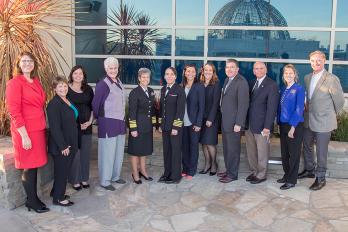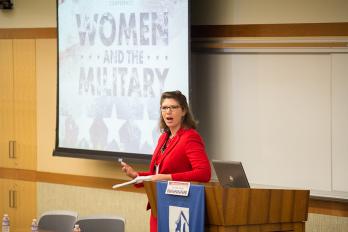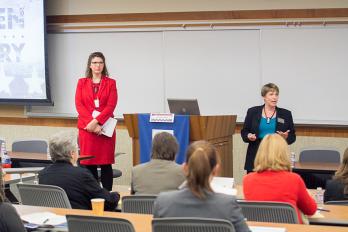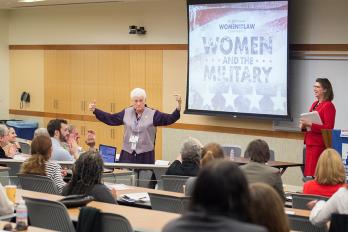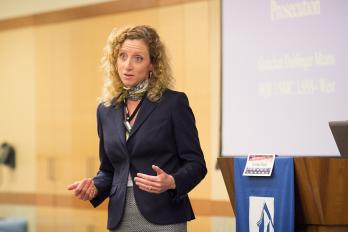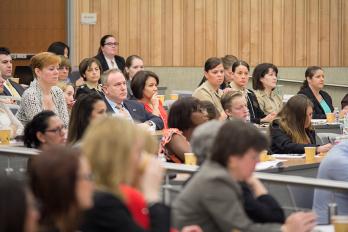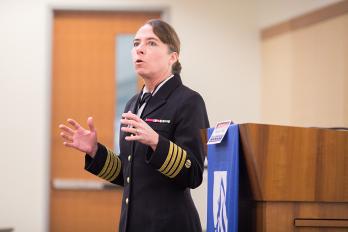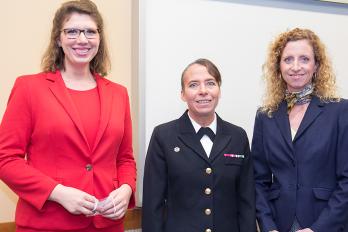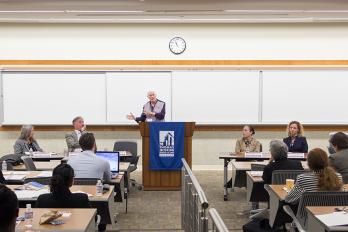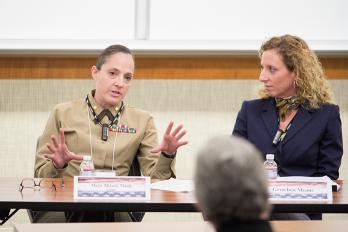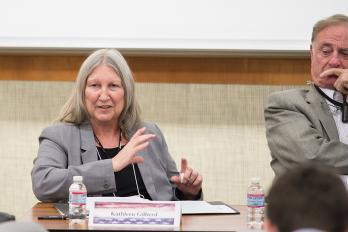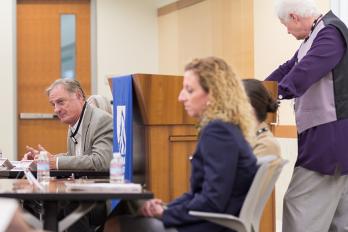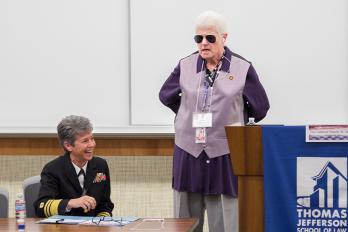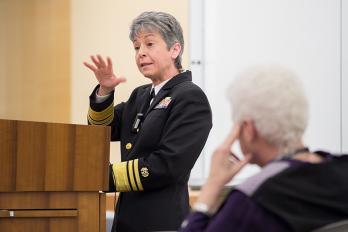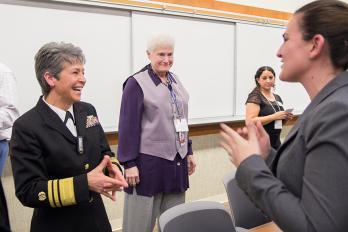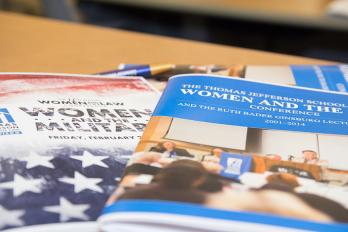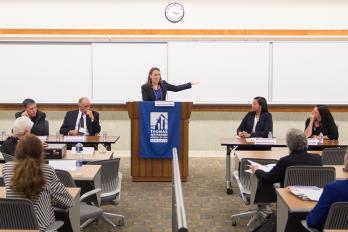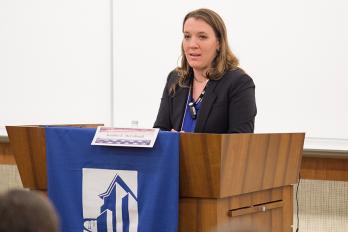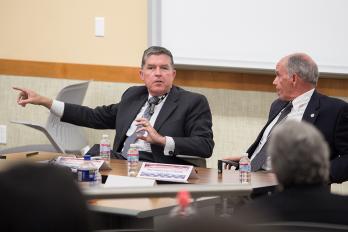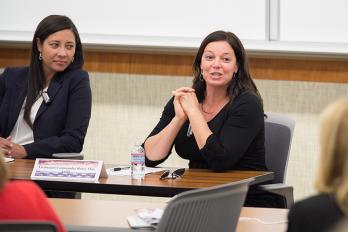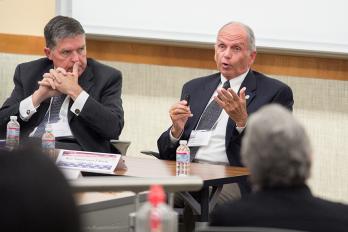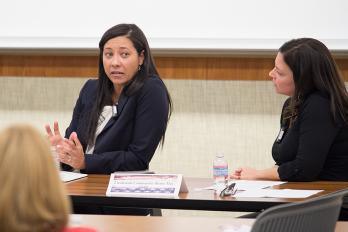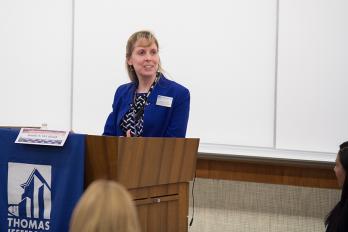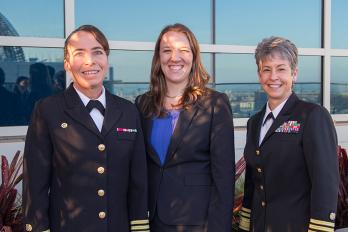Thomas Jefferson School of Law Holds Conference on Women and the Military
February 24, 2014
The 2014 Women and the Law conference, held on Friday, February 21, focused on women and the military. This event provided an opportunity to learn about a number of issues, including whether new statistics on sexual assault in the military warrant legislative changes to the Uniform Code of Military Justice, and explored the topic of women serving in elite combat units.
“I was particularly pleased with the way that this year’s conference encouraged lawyers and students from both the military and civilian communities to discuss the difficult and sensitive topic of sexual assault in the military,” said conference organizer Professor Amy Day. “It was clear that conference attendees were deeply engaged in the conversation, and that was precisely our goal.”
The morning panel, moderated by Colonel Jane L. Siegel, USMC (Ret.), explored the political and legislative dimensions of recent highly-publicized statistics on sexual assault in the military, including whether changes to the Uniform Code of Military Justice are likely to be effective in combating these crimes. The panel discussed the rights of accused service members and the implications of the potential removal of the discretion of the military convening authority in courts martial.
“Our panelists and presenters helped lead the conversation beyond simplistic overgeneralizations, and I am confident that our guests came away from the conference with a deeper understanding of the unique dynamics of sexual assault prosecution in the military,” said Professor Day.
The keynote speaker, Vice Admiral Nanette DeRenzi, serves as Judge Advocate General of the U.S. Navy. She is the first woman to hold this position. The 2014 Ruth Bader Ginsburg Lecturer, Captain Stacy Pedrozo, serves as the Commanding Officer of the Naval Justice School, which trains every lawyer in the Navy and Marine Corps. Captain Pedrozo and Vice Admiral DeRenzi addressed not just the topic of sexual assault prosecution and prevention, but also offered their own reflections on the changing leadership roles of women in the military.
“I think that we are concerned and committed to having more women in the military not only because we are advocates of major social change or major revolution,” said Captain Pedrozo. “It is because we want to be better war fighters. That’s what this is about.”
“I was extremely interested in the presentation of Captain Pedrozo,” said Ian Seruelo (3L). “While much still needs to be done in taking down the barriers of different forms of discrimination in our society, it is great to see the changes and the gains in the inclusion of women in the military.”
“It is always inspiring to meet women who have been successful in their legal careers, such as keynote speaker Vice Admiral Nanette DeRenzi,” said event attendee Kelly Wilson.
Wilson is a graduate of the University of Oklahoma School of law and is now a member of the Military Spouse J.D. Network. She recently relocated to San Diego with her active duty husband and two year old son. “As a military spouse and lawyer, the issues discussed, such as the prevalence of sexual assault in the military and women serving in elite combat units, are very relevant, so it was great to hear a balanced and thoughtful discussion of the issues. What stood out most to me are the differences in the way sexual assault cases are handled under the UCMJ as highlighted by panelist Gretchen Means.” Ms. Means is the Sexual Assault and Complex Litigation Highly Qualified Expert for the United States Marine Corps LSSS-West.
The afternoon panel, moderated by Jennifer McCollough ’13, a former Navy lieutenant and helicopter pilot, explored the feasibility of women integrating into the elite forces of the U.S. military. The panel consisted of both active and former active-duty service members discussing issues such as equipment and standards along with lessons learned when the military has previously integrated underrepresented service members into various communities.
“Professor Day did an outstanding job of organizing the conference and assembling the right people to discuss the right topics,” said McCollough. “It was an honor to return to TJSL and lead the discussion on women in the elite combat forces with such an esteemed list of speakers. Going into the conference and preparing for my panel, I had some misgivings about women’s success in particular military units, but we had a great group of panelists frankly discussing how it could be done. I am very thankful for the panelists’ time, expertise, and perspective. Overall, the issues that were discussed throughout the day had been a recurring theme while I was on active-duty, and it was great to hear the strides that are being made.”
“I was impressed by the diversity and knowledge in the room, not only from the keynote speakers and panelists, but also from the audience members,” said panelist Kristen Kavanaugh, who served as a captain in the U.S. Marine Corps. “Our conversations about women’s service in the military are moving the country forward, and we must recognize that there is space in those conversations for a spectrum of opinions. We are stronger together, and that was evident during the conference.”
Thomas Jefferson School of Law is a longtime leader in the education of men and women who have served in the U.S. military. Eleven percent of the Fall 2013 incoming class served in uniform, and the school is home to a Veteran’s Legal Assistance Clinic and an on-campus chapter of Student Veterans of America.
“As a military spouse, the coordinator for the campus chapter of the Military Spouse JD Network (MSJDN) and a future attorney, the conference provided me with a wealth of information about military law,” said TJSL student Precious Harrison-Cobb (2L). “The conference helped me to understand some of the overall issues of women in law from various perspectives, whether it is a spouse, active duty, reservist, or veteran. I plan to use this information as a foundation to help bring a resolution to some of the issues that women in the military still face and are working diligently to resolve. Along with Professor Day, I am working to develop an outreach organization for military spouses and MSJDN has helped spark some great ideas that we could implement here in the TJSL community.”
The first Women and the Law Conference was held in 2001 and created by TJSL Professors Julie Greenberg, Susan Tiefenbrun and Susan Bisom-Rapp. The Women and the Law Conference was the first lecture series in the western United States focusing exclusively on issues related to gender and the law. Last year’s conference was attended by U.S. Supreme Court Justice Ruth Bader Ginsburg, who lends her name to the conference lecture series.
View the 2014 WLC History | 2014 WLC Program
Videos of the Women and the Law Conference, February 21, 2014
-
Introduction, Gretchen Means, Ruth Bader Ginsburg Lecturer: Captain Stacy A. Pedrozo
-
Panel Discussion: Do Recent Statistics on Sexual Assault in the Military Warrant Further Changes to the Uniform Code of Military Justice?
-
Keynote Speaker: Vice Admiral Nanette M. DeRenzi
- Panel Discussion: Women’s Service in Elite Combat Forces
The views expressed by the conference participants do not necessarily reflect those of the Department of Defense or Department of the Navy.
